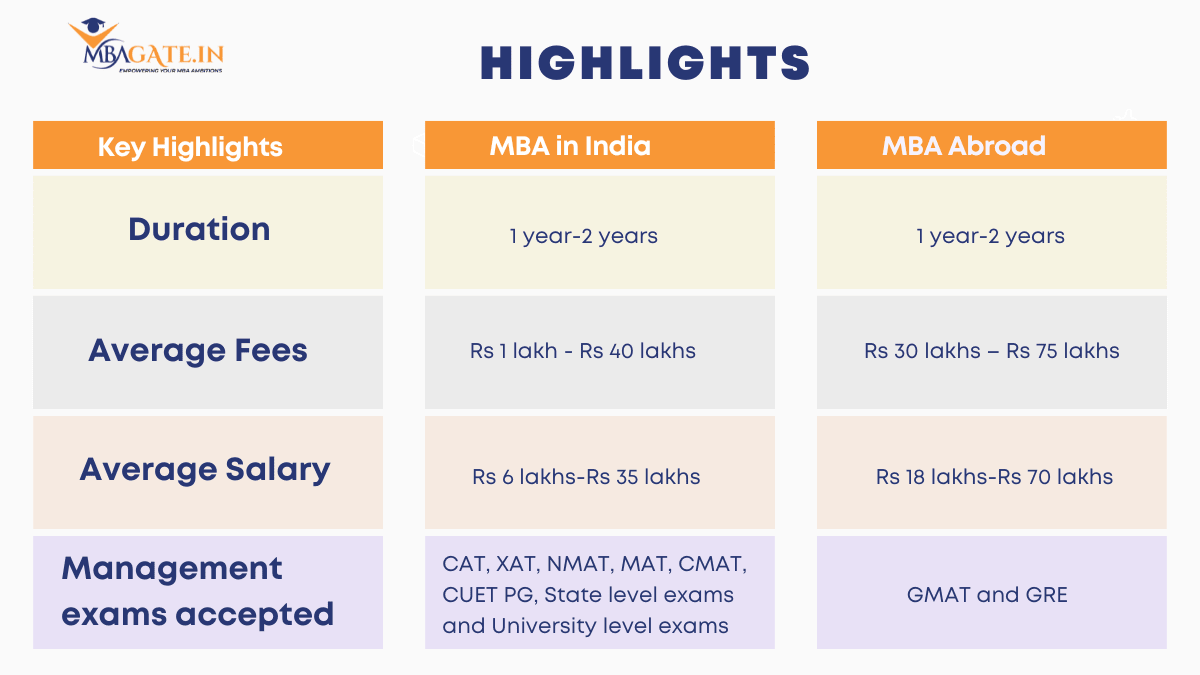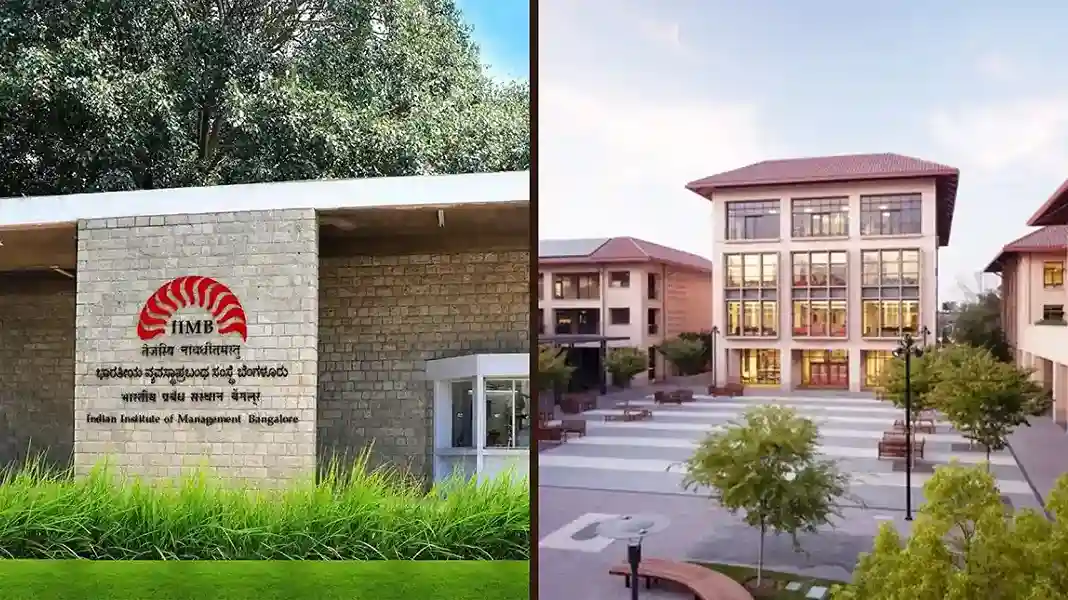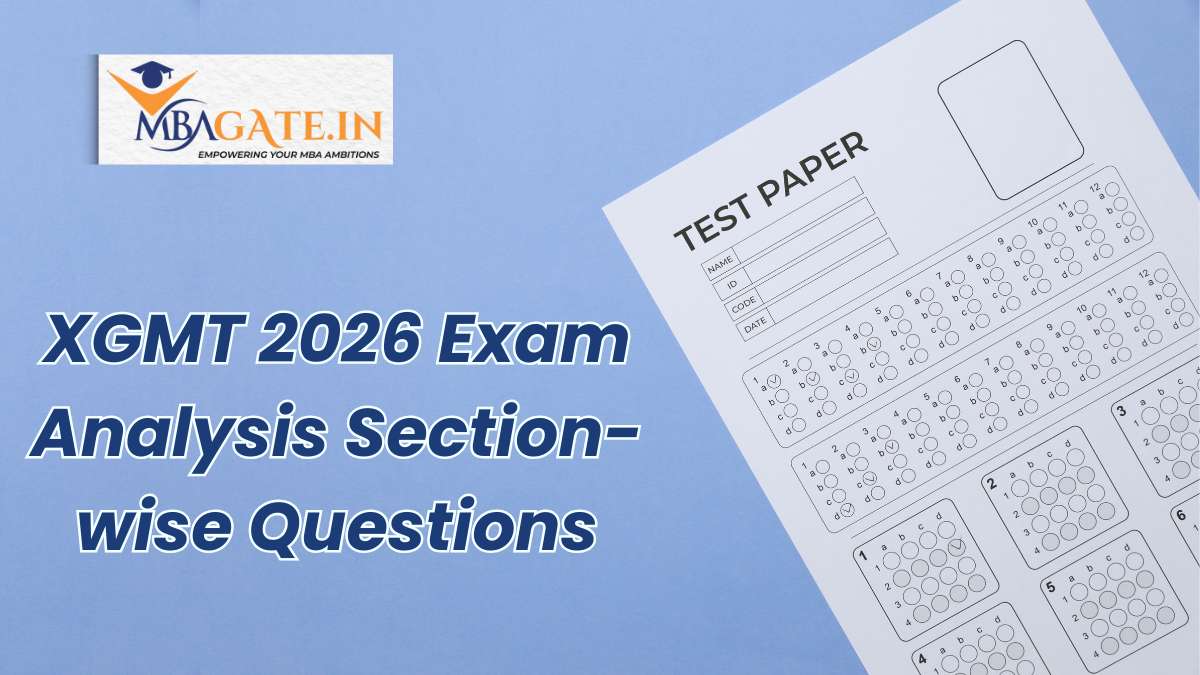MBA in India Vs MBA Abroad: A comprehensive analysis
Table of Content
-
- + more items Show less
Whether it is an MBA in India or one abroad, both are a big step towards shaping your career. Premier Indian institutes, like the top-ranked IIMs and ISB, offer fierce competition to universities abroad in ranking and pedagogy. However, international universities offer international exposure and unmatched prestige and diversity. This makes it a challenging decision whether one should choose an MBA abroad or in India. One must evaluate personal aspirations against budget and financial goals.
Highlights
The table below mentions the details of the two alternatives for an MBA aspirant.

Management Studies in India Vs Management Studies Abroad
The students need to consider the specialisation they want to pursue, the budgets they have, their long term goals, academic strengths and weaknesses.

Exams Accepted
The GMAT, conducted by GMAC, is an adaptive test that enables a smart test taker to secure a high score. GMAT is more suitable for aspirants with an advanced or proficient level of English and higher critical reasoning ability. The verbal review section of the GMAT is more challenging than the CAT. The vocabulary is tougher and the complexity of passages is higher. The quantitative review section is comparatively easier than the CAT. The questions are concise to solve, calculations are easier and consume less time of the test taker.
The Data Insights section of the GMAT requires the candidates to be quick at calculations. A candidate with high focus and the ability to work with lengthy data can excel at this section. However, the CAT combines the logical reasoning and data interpretation sections where the test taker is required to solve puzzles that vary from a moderate to high level. Each puzzle is followed by 4-5 questions.
The CAT, overall, is a low-scoring test. A test taker with 99th percentile marks, solves around 50% of the questions correctly, while the GMAT is a high-scoring test. The CAT uses a negative marking system of -1 for each incorrectly answered question, whereas the GMAT does not.
Work Experience
In India, the candidates don’t need to have work experience for the 2-year MBA program. The entrance exam score, academic background and interview plays a major role. However, while applying to the top colleges abroad, the student requires a holistic profile review. This includes a 2-5 years of work experience, recommendations and essays.
Return on investment and Internation exposure
Indian B schools are more affordable than their international counterparts. The tuition fees is lower in the top IIMS and government colleges like FMS, TISS and JBIMS. They offer a higher return on the investment. This is not the case if one graduates from the top colleges abroad where the fees goes upto ₹60-70 lakhs and the lifestyle is costlier. Proximity to home and lower travel cost reduce the financial burden. Scholarships offset costs, but potential debt is significant. Unless one wants global recognition, a top-ranked college in India is more economical than a tier two college abroad.
Colleges abroad offer culture immersion, broadened academic horizons and enhanced career prospects. One can gain a global perspective and network with people from diverse backgrounds. Global alumni networks assists one in securing a multinational goal. However, it is recommended to choose a tier two college abroad, if one aims to settle there. Competition being higher in India, students from IIMs and IITs are preferred by the corporates. The curriculum in Indian B schools is more tailored for the local market, however, to gain international exposure and acquire a practical knowledge of global markets, management education abroad is more suitable.
Education system abroad
India offers a limited niche specialisation, but education abroad promotes experiential and practical learning. Niche specialisations are offered abroad, such as AI-driven business strategy, social impact and luxury brand management. Education abroad develops a global mindset, enables creativity and is suited to innovation-driven roles.
Focus on Entrepreneurship
As the startup ecosystem is valued at $350 billion, Indian B schools have included innovation and an MBA in family-managed business in their curriculum. Colleges like the top IIMs and ISB offer mentorship programs and venture capital partnerships to students. For Indian students who want to participate in the growing startup culture, Indian B schools will be a more calculated choice. The students will have access to the local market insights, an opportunity to know the market from scratch and secure funding. This way the students can leverage family support and industry connections.
Currently, alumni from top Indian B schools dominate leadership roles in corporations and startups. In the absence of language barriers and cultural adaptation challenges, the graduates can focus on professional growth.
Aligning the Management journey with Vision
The dream to pursue an MBA in India or abroad hinges on the financial readiness, growth objectives and career vision. Both empower professionals to lead organisations. Internships, corporate collaborations and case studies, in both cases, instil business acumen. The points below contain precise objectives to make a choice
Choose India if
Cost effectiveness and cultural familiarity
You seek domestic networks or mentorship
You choose to become an entrepreneur
Choose abroad if
You aspire global leadership roles and exposure to International Market
You can invest in high upfront costs
You will value niche specilaisations









